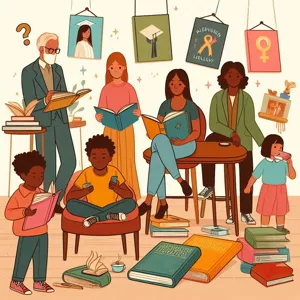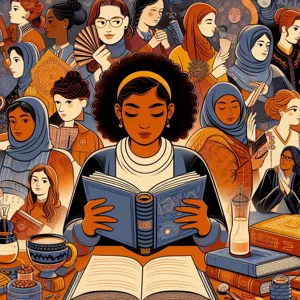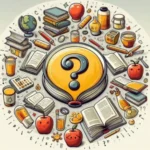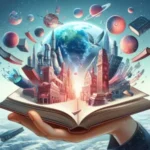In a world where perspectives often clash and biases run deep, literature serves as a powerful medium for fostering understanding and empathy.
“Expanding Your Horizons: Finding Books That Challenge Your Views on Gender, Race, and Class” invites readers to embark on a transformative journey through the pages of thought-provoking titles that probe the complexities of identity and societal structures. This post will guide you through a carefully curated selection of books that not only challenge conventional narratives but also push you to confront your own assumptions. From gripping memoirs that recount personal struggles to compelling fiction that weaves intricate tales of diversity and resilience, these reads will inspire you to reflect on your views and spark meaningful conversations. Join us as we explore the literary works that can expand your understanding of the world, encourage critical thinking, and ultimately contribute to a more inclusive and compassionate society.
1. Introduction: The Importance of Diverse Perspectives

In a world increasingly interconnected yet often divided, the importance of diverse perspectives cannot be overstated. Engaging with literature that challenges our views on gender, race, and class not only broadens our horizons but also fosters empathy, understanding, and critical thinking. Books serve as windows into the lives of others, offering insights that are often absent from our daily experiences. They compel us to step outside of our comfort zones and confront our biases, encouraging us to question societal norms and reflect on our own identities.
Reading works from a variety of voices—whether it be marginalized authors, activists, or scholars—allows us to see the complexities of human experience through different lenses. These narratives can illuminate the struggles and triumphs of those whose stories are often overlooked, deepening our appreciation for the richness of diversity. By exploring themes of gender, race, and class through literature, we not only educate ourselves but also cultivate a more inclusive worldview, paving the way for meaningful conversations and social change.
In this blog post, we will delve into a selection of impactful books that challenge conventional perspectives and inspire readers to engage with the pressing issues of our time. These titles invite us to reflect on our own beliefs and biases, urging us to grow as individuals and as a society. Join us on this journey to discover literature that not only entertains but also enlightens, encouraging us to expand our horizons and embrace the beauty of diverse perspectives.
2. Understanding Gender, Race, and Class: Key Concepts
Understanding the intricacies of gender, race, and class is essential for anyone looking to expand their perspective on societal structures and personal identity. These concepts are not merely academic theories; they are powerful lenses through which we can analyze the world around us and our place within it.
**Gender** encompasses more than just biological differences; it involves the roles, behaviors, and expectations society assigns to individuals based on their perceived sex. It shapes our experiences from the moment we are born, influencing everything from our education to our career prospects. Exploring literature that challenges traditional gender norms can reveal the complexities of gender identity and the struggles individuals face in defying societal expectations.
**Race**, similarly, is not solely defined by skin color or ethnicity. It encompasses a historical and social construct that has profound implications for identity and experience. Books that delve into the nuances of race often expose the systemic inequalities that persist in society, providing insight into the lived realities of marginalized communities. Engaging with diverse narratives can foster empathy and understanding, challenging preconceived notions and stereotypes.
**Class**, often intertwined with race and gender, refers to the socio-economic stratification that affects access to resources, opportunities, and privileges. Literature that addresses class disparities can illuminate the barriers faced by individuals from different socio-economic backgrounds and encourage readers to reflect on their own positions within this hierarchy. Understanding class dynamics is crucial for recognizing the complexities of privilege and oppression in our society.
By immersing yourself in literature that explores these key concepts, you not only challenge your own views but also cultivate a deeper understanding of the interconnectedness of gender, race, and class. This journey of exploration can be transformative, prompting critical conversations and inspiring action toward social justice and equality.
3. The Impact of Literature on Social Perspectives

Literature has long served as a mirror reflecting society’s values and beliefs, but it also acts as a powerful catalyst for change, challenging entrenched views and prompting readers to reevaluate their perspectives on gender, race, and class. When we delve into the pages of a book that explores these themes, we engage in a dialogue with the author and, by extension, with ourselves. This dialogue can be transformative.
Books that tackle issues of social justice and inequality often present narratives that are rich in experience and steeped in emotion. They allow us to step into the shoes of characters whose lives are vastly different from our own, offering insights into the struggles and triumphs faced by marginalized communities. For instance, works such as Toni Morrison’s “Beloved” delve into the painful legacy of slavery and its enduring impact on identity and family. Such narratives not only educate readers but also evoke empathy, fostering a deeper understanding of the complexities of human experience.
Moreover, literature has the power to challenge prevailing stereotypes and misconceptions. By shining a light on the lived experiences of individuals from various backgrounds, authors can dismantle the simplistic narratives often perpetuated by mainstream media. Books like Chimamanda Ngozi Adichie’s “Americanah” confront issues of race and identity with nuance, encouraging readers to question their assumptions and engage in critical dialogue about race relations in contemporary society.
In this way, literature becomes a tool for social change. It inspires conversations about privilege, power dynamics, and systemic inequality, prompting readers to reflect on their roles within these structures. As we immerse ourselves in these challenging texts, we not only expand our own horizons but also contribute to a larger cultural discourse aimed at fostering understanding and inclusivity. By embracing literature that challenges our views, we take a step towards building a more equitable society, one page at a time.
4. How to Identify Books That Challenge Your Views
Identifying books that challenge your views on gender, race, and class requires both intentionality and openness to new perspectives. Start by exploring curated lists from reputable sources—literary organizations, social justice advocates, and educational institutions often compile recommendations that delve into these critical themes. Websites like Goodreads, Book Riot, or even the New York Times Book Review can be treasure troves of titles that push boundaries.
Engage with communities that focus on diverse voices. Online book clubs and forums, such as those on Facebook or Reddit, often spotlight works that tackle complex social issues. Participating in discussions or simply lurking can expose you to titles you might not have considered before. Additionally, follow authors, activists, and scholars on social media who focus on gender, race, and class issues. Their recommendations and insights can lead you to transformative literature that challenges societal norms.
Look for books that have received critical acclaim or have sparked conversation—these often tackle tough subjects head-on. Pay attention to awards like the National Book Award or the Pulitzer Prize, which frequently honor works that delve into social issues. Remember to explore outside your comfort zone; fiction, memoirs, essays, and even graphic novels can all offer profound insights into the complexities of identity and society.
Lastly, critically assess your own reading habits. Reflect on the perspectives and narratives you typically gravitate towards, and actively seek out books that provide contrasting viewpoints. This self-awareness not only broadens your literary palate but also enriches your understanding of the multifaceted world we live in. Embrace the challenge of reading widely; it can be an enlightening journey that fosters empathy and a deeper comprehension of the diverse realities that shape our society.
5. Recommended Fiction: Stories that Open Your Mind

Fiction has a remarkable ability to transport readers into the hearts and minds of characters from vastly different backgrounds, offering a unique lens through which to examine complex societal issues. Here are some thought-provoking novels that not only entertain but also challenge your perceptions of gender, race, and class.
1. **”The Night Circus” by Erin Morgenstern** – This enchanting tale of a magical competition set within a mysterious circus weaves themes of identity and expectation. Through the lens of its two protagonists, Celia and Marco, readers are invited to explore the constraints of gender roles and the power dynamics that shape their destinies. The lush imagery and intricate plot invite readers to question the rigidity of societal norms.
2. **”Americanah” by Chimamanda Ngozi Adichie** – Adichie’s powerful narrative follows Ifemelu, a Nigerian woman who moves to America, where she confronts the complexities of race and identity in a new cultural landscape. The novel challenges preconceived notions about race and privilege while highlighting the immigrant experience. As Ifemelu navigates her way through relationships and the realities of race in America, readers gain insight into the nuances of belonging and self-discovery.
3. **”The Underground Railroad” by Colson Whitehead** – This Pulitzer Prize-winning novel reimagines the historical Underground Railroad as an actual railroad system, following Cora, a young slave, as she escapes from a Georgia plantation. Through Cora’s harrowing journey, Whitehead tackles themes of race, oppression, and resilience, compelling readers to confront the historical injustices that persist in modern society.
4. **”The Hate U Give” by Angie Thomas** – This contemporary young adult novel centers around Starr Carter, a teenager who witnesses the police shooting of her friend. As she grapples with her dual identity—navigating life in a poor, predominantly Black neighborhood while attending a wealthy, mostly white school—Starr’s journey sparks a broader conversation about systemic racism and social injustice. Thomas’s impactful storytelling resonates deeply, encouraging readers to reflect on their own views and the world around them.
5. **”Pachinko” by Min Jin Lee** – Spanning several generations, this sweeping family saga chronicles the lives of Korean immigrants in Japan. Through the lens of patriarchy, class struggle, and the immigrant experience, Lee’s novel captures the resilience of her characters as they navigate a society marked by discrimination and hardship. “Pachinko” ultimately serves as a powerful reminder of the intersections of race, identity, and belonging.
Engaging with these stories not only enriches your reading experience but also encourages critical reflection on issues that shape our society. By stepping into the shoes of diverse characters, you can broaden your perspective and foster empathy for those whose experiences differ from your own. As you explore these narratives, challenge yourself to question your assumptions and consider new viewpoints, expanding your horizons in the process.
6. Essential Non-Fiction Reads: Insights and Analysis
When it comes to understanding the complex interplay of gender, race, and class in society, non-fiction books serve as invaluable resources. They provide insights that challenge our preconceived notions and encourage us to think critically about the world around us. Here are a few essential reads that delve into these themes, offering both analysis and personal narratives that illuminate the experiences of marginalized groups.
First on the list is **“Sister Outsider” by Audre Lorde**, a powerful collection of essays and speeches that explore the intersections of race, gender, and sexuality. Lorde’s eloquent prose and sharp analysis challenge readers to confront their own biases and understand the importance of intersectionality in activism. Her work remains a cornerstone for anyone seeking to engage with feminist thought and the struggles of Black women.
Next, **“The New Jim Crow: Mass Incarceration in the Age of Colorblindness” by Michelle Alexander** is a must-read for those interested in the systemic racism embedded in the American criminal justice system. Alexander argues that mass incarceration has effectively created a racial caste system, and her meticulous research and compelling arguments force readers to reevaluate the implications of crime and punishment in society.
Another profound work is **“White Fragility: Why It’s So Hard for White People to Talk About Racism” by Robin DiAngelo**. This book tackles the defensive moves that white people make when challenged racially, urging readers to understand their privilege and the impact of systemic racism on society. DiAngelo’s insights pave the way for meaningful conversations about race and encourage self-reflection and growth.
Lastly, consider **“Where Do We Go from Here: Chaos or Community?” by Martin Luther King Jr.** In this thought-provoking book, King reflects on the civil rights movement and the ongoing struggles for equality. His visionary ideas about social justice, economic parity, and community engagement continue to resonate today, making it essential reading for anyone seeking to understand the roots of systemic injustice.
These non-fiction titles not only broaden your perspective but also equip you with the knowledge to engage in critical discussions about the structures that shape our lives. By immersing yourself in these essential reads, you can deepen your understanding of gender, race, and class, ultimately fostering empathy and driving change in your community.
7. Young Adult Literature: Challenging Perspectives for All Ages

Young Adult (YA) literature has long been a powerful medium for exploring complex themes surrounding gender, race, and class, making it an invaluable resource not just for teenagers but for readers of all ages. It’s a genre that defies the stereotype of being solely for young readers; its narratives often delve into the intricacies of identity, the struggles against societal norms, and the quest for belonging, effectively resonating with a broader audience.
One of the unique strengths of YA literature is its ability to present challenging perspectives in an accessible yet thought-provoking manner. Authors like Angie Thomas, with her groundbreaking novel *The Hate U Give*, and Elizabeth Acevedo, through works like *The Poet X*, tackle issues related to race and class, offering raw and honest portrayals of the experiences faced by marginalized communities. These narratives not only illuminate the struggles of their characters but also encourage readers to reflect on their own beliefs and biases.
Moreover, YA literature often incorporates diverse voices and experiences, representing a wide array of identities that enrich the conversation around gender and class. Books like *Simon vs. the Homo Sapiens Agenda* by Becky Albertalli and *Cemetery Boys* by Aiden Thomas showcase the complexities of gender identity and sexuality, inviting readers to engage with perspectives that may be outside their own lived experiences.
Reading YA literature can be a transformative experience, prompting discussions about privilege, empathy, and social justice. It invites us to examine our own views and encourages us to step into the shoes of characters who navigate a world that can be both wonderfully diverse and unfathomably challenging. As you expand your horizons, consider picking up a YA novel that challenges your perspectives. You might find that these stories resonate with you in ways you never expected, reinforcing the idea that the journey to understanding begins with a willingness to listen and learn.
8. Exploring Global Voices: Books from Different Cultures
In our increasingly interconnected world, the literature we consume plays a pivotal role in shaping our understanding of diverse perspectives. **Exploring Global Voices: Books from Different Cultures** invites you to embark on a literary journey that transcends borders and challenges the conventional narratives surrounding gender, race, and class. By delving into the rich tapestry of global literature, you not only broaden your horizons but also cultivate a deeper empathy for experiences that are different from your own.
Start with authors who offer authentic representations of their cultures and experiences. Books like Chimamanda Ngozi Adichie’s *Half of a Yellow Sun* provide a visceral insight into the complexities of Nigerian identity, gender dynamics, and the impact of colonialism on contemporary society. Similarly, Khaled Hosseini’s *The Kite Runner* immerses readers in the struggles of Afghan culture, weaving themes of friendship, betrayal, and redemption through a narrative that addresses class disparities and the lingering effects of war.
Don’t overlook literature from indigenous voices, such as Louise Erdrich’s *The Round House*, which tackles issues of race, identity, and the systems of oppression that affect Native American communities. These narratives challenge readers to confront their assumptions and reflect on the societal structures that shape our worldviews.
Additionally, exploring works in translation can open doors to new perspectives. Authors like Haruki Murakami and Elena Ferrante offer uniquely nuanced explorations of identity and gender roles within their respective cultural contexts, revealing how these themes resonate universally.
By engaging with literature from different cultures, you not only enrich your reading experience but also foster a more inclusive understanding of the complexities of human existence. Each book serves as a portal into lives shaped by different histories and struggles, allowing you to challenge your views on gender, race, and class. Embrace the opportunity to learn, reflect, and grow through the powerful voices of global literature.
9. The Role of Memoirs in Understanding Personal Experiences
Memoirs serve as powerful windows into the unique lives of individuals, allowing readers to traverse experiences that may be vastly different from their own. These personal narratives often challenge preconceived notions about gender, race, and class, offering a firsthand look at the complexities of identity and the social structures that shape our lives. Through the intimate lens of memoir, readers can explore the intricacies of personal struggles, triumphs, and the nuanced realities of marginalized communities.
When we delve into memoirs, we enter a world where the author’s voice resonates with authenticity, revealing the emotions and thoughts that accompany their journey. For instance, a memoir recounting the trials of a woman navigating systemic sexism in her workplace can illuminate the pervasive nature of gender inequality, compelling readers to confront their own biases and consider the broader implications of such experiences. Similarly, narratives from individuals of diverse racial and socio-economic backgrounds provide invaluable insights into the intersectionality of race and class, highlighting how these factors intertwine to shape one’s life path.
Reading memoirs not only fosters empathy but also encourages critical reflection. They challenge us to question our assumptions, broaden our understanding of societal issues, and cultivate a deeper awareness of the struggles faced by others. By engaging with these personal stories, we can begin to dismantle stereotypes and foster meaningful conversations around the complexities of gender, race, and class. Ultimately, memoirs serve as a vital tool for anyone seeking to expand their horizons and cultivate a more inclusive worldview.
10. Engaging with Controversial Topics: Books that Spark Debate
Engaging with controversial topics can be a transformative experience, pushing us to confront our beliefs and explore new perspectives. Books that spark debate often serve as catalysts for conversations that might otherwise remain unexamined. These provocative reads challenge our views on gender, race, and class, forcing us to grapple with complex societal issues and, ultimately, encouraging personal growth.
Consider titles like “The Gendered Society” by Michael Kimmel, which delves into the social construction of gender and its implications on both men and women. Kimmel’s straightforward yet thought-provoking arguments can ignite discussions about the rigid definitions of masculinity and femininity, prompting readers to reflect on their own experiences and societal norms.
Another powerful book is “Between the World and Me” by Ta-Nehisi Coates. Written as a letter to his son, Coates navigates the harsh realities of being Black in America, weaving personal anecdotes with historical context. His eloquent prose forces readers to confront uncomfortable truths about race, privilege, and the ongoing struggle for equality. Engaging with Coates’s work can spark debates about systemic racism and the role of education in fostering understanding.
For those interested in class dynamics, “Nickel and Dimed” by Barbara Ehrenreich offers a stark portrayal of low-wage work in America. Through her immersive investigation, Ehrenreich reveals the daily struggles faced by millions of workers, challenging readers to reconsider their perceptions of poverty and the American Dream. This book can prompt meaningful discussions about economic inequality and the structural barriers that perpetuate it.
These titles not only provoke thought but also encourage empathy and introspection. By engaging with controversial topics, readers can expand their horizons, enriching their understanding of the world while fostering a more inclusive dialogue about the intricate intersections of gender, race, and class. Whether you’re seeking to challenge your own views or engage in spirited conversations with others, these books are invaluable tools for fostering understanding and sparking critical discussions.
11. Creating a Diverse Reading List: Strategies and Tips
Creating a diverse reading list is an essential step toward broadening your perspectives and challenging your views on gender, race, and class. The goal is not merely to read more books but to dive into narratives that push the boundaries of your understanding and expose you to experiences different from your own. Here are some strategies and tips to help you curate a reading list that reflects a wide range of voices and viewpoints.
**1. Explore Different Genres:** Don’t limit yourself to just one genre. Fiction, non-fiction, poetry, and graphic novels can all offer unique insights into social issues. For instance, a memoir may provide a deeply personal account of race, while a historical novel can illustrate the complexities of class struggles through its characters’ journeys.
**2. Seek Out Diverse Authors:** Actively search for books written by authors from various backgrounds. This includes not only those from different racial and ethnic groups but also LGBTQ+ writers, authors with disabilities, and those from various socioeconomic backgrounds. Their experiences can shed light on issues that you may not encounter in mainstream literature.
**3. Join Reading Groups:** Engage with book clubs or reading groups that focus on diversity. These platforms not only introduce you to a wider array of titles but also allow you to discuss and reflect on the themes and perspectives presented, deepening your understanding of each book’s context.
**4. Use Reading Lists and Recommendations:** Leverage curated reading lists from reputable sources, such as literary organizations, educational institutions, or social justice groups. These lists often highlight books that tackle complex social issues and are written by diverse authors.
**5. Set Intentional Goals:** Consider setting a goal for your reading. For example, you might aim to read a certain number of books each month that focus on different aspects of gender, race, and class. This intentionality can motivate you to seek out a variety of perspectives.
**6. Be Open to Discomfort:** Some books may challenge your beliefs and make you uncomfortable. Embrace this discomfort as a vital part of your learning process. It’s through grappling with differing viewpoints that you can expand your understanding and empathy.
**7. Reflect and Share:** After finishing a book, take time to reflect on what you’ve learned and how it challenges your views. Consider sharing your thoughts on social media or with friends to foster discussions around the themes you’ve encountered.
By employing these strategies, you can create a reading list that not only enriches your understanding but also cultivates a deeper appreciation for the diverse tapestry of human experiences. Each book you choose offers a new lens through which to view the world, encouraging you to engage thoughtfully with the complexities of gender, race, and class. Happy reading!
12. Joining Book Clubs: Discussion as a Tool for Growth
Joining book clubs can serve as a transformative avenue for expanding your understanding of complex topics such as gender, race, and class. These clubs create a space where individuals come together to explore diverse perspectives, fostering not just reading but meaningful dialogue. Engaging with others who may have different backgrounds and experiences can illuminate blind spots in your worldview, encouraging you to think critically about the narratives you encounter in literature.
When you participate in a book club, the discussions often go beyond the pages of the book. Members share personal anecdotes, cultural insights, and historical contexts that enrich the reading experience. For instance, a novel that tackles race might spark a conversation about systemic inequality, prompting you to consider how these issues manifest in your own community. You might find that a seemingly straightforward narrative on gender dynamics leads to a deeper exploration of societal expectations, privilege, and intersectionality.
Additionally, book clubs often introduce participants to works they might not have chosen themselves. This intentional exposure to varied genres and authors can challenge preconceived notions and expand your literary palate. Whether it’s delving into memoirs that recount lived experiences or engaging with fiction that tackles societal issues, the collective journey through literature can enhance empathy and understanding.
In these discussions, the act of sharing your thoughts and listening to others is invaluable. It encourages you to articulate your views while remaining open to critique and alternative perspectives. This collaborative learning environment fosters growth, not just in your understanding of the subjects at hand, but also in your ability to engage in respectful and constructive conversations about sensitive topics.
So, if you’re looking to expand your horizons and challenge your views, consider seeking out a book club that focuses on literature addressing gender, race, and class. You might discover that the conversations that unfold are as rewarding as the books themselves.
13. The Benefits of Challenging Your Perspectives
Challenging your perspectives can be one of the most rewarding experiences you embark on in your literary journey. When you open a book that fundamentally opposes or questions your views on gender, race, and class, you’re not just reading a story; you’re entering a dialogue that has the potential to reshape your understanding of the world.
One significant benefit of engaging with diverse viewpoints is the development of empathy. As you navigate the lives and experiences of characters who face systemic challenges or societal biases, you begin to see the world through their eyes. This practice of stepping outside your own narrative fosters a deeper emotional connection to the struggles and triumphs of others, cultivating compassion that extends beyond the pages of a book and into your everyday interactions.
Moreover, confronting these challenging perspectives can prompt critical thinking. Books that delve into complex themes encourage readers to question their assumptions and beliefs, leading to a more nuanced understanding of societal dynamics. Rather than accepting the status quo, you develop the ability to analyze and critique injustices, becoming a more informed and engaged citizen in your community.
Additionally, expanding your horizons through literature enhances your intellectual curiosity. It pushes you to seek out authors from different backgrounds, cultures, and experiences, enriching your reading list and exposing you to ideas that may have previously been foreign to you. This openness not only broadens your knowledge base but also sparks conversations with others, allowing for meaningful exchanges about the themes explored in the books you read.
In essence, the benefits of challenging your perspectives through literature are profound. By confronting your biases and embracing diverse narratives, you cultivate a more inclusive worldview, foster empathy, enhance critical thinking, and ignite a lifelong passion for learning. So, grab that book that makes you uncomfortable—your journey toward a richer understanding of gender, race, and class begins with each turned page.
14. Conclusion: Committing to Lifelong Learning Through Literature
In a world that is ever-evolving and increasingly interconnected, the commitment to lifelong learning has never been more critical. Literature serves as a powerful vehicle for this journey, allowing us to explore diverse perspectives and challenge our preconceived notions about gender, race, and class. By engaging with books that push the boundaries of our understanding, we open ourselves to new ideas and experiences that enrich our lives and shape our interactions with others.
As we conclude our exploration of expanding horizons through literature, it is essential to recognize that this endeavor is not a one-time event but rather a continuous process. Each book we read has the potential to ignite curiosity, provoke thoughtful discussions, and inspire change within ourselves and our communities. The stories we encounter can become catalysts for empathy, as we step into the shoes of characters whose lives differ vastly from our own.
Moreover, committing to this journey of learning through literature encourages critical thinking and fosters a deeper connection to the issues that permeate our society. Whether it’s through novels, essays, or poetry, the written word invites us to question norms, confront biases, and ultimately grow.
In the pursuit of understanding gender, race, and class, let us remain steadfast in our commitment to seek out narratives that challenge us. Embrace the discomfort that comes with confronting difficult topics; it is often in these moments of unease that we experience the most profound growth. Together, let us cultivate a lifelong love for reading that not only broadens our horizons but also empowers us to be more compassionate and informed individuals in an increasingly complex world.
15. Additional Resources: Where to Find More Thought-Provoking Reads
When it comes to expanding your understanding of complex social issues such as gender, race, and class, the right resources can make all the difference. Beyond your local bookstore or library, a wealth of thought-provoking reads awaits you in various places that cater specifically to diverse perspectives and marginalized voices.
**1. Online Bookstores and Platforms:** Websites like Bookshop.org and IndieBound support independent bookstores while offering a curated selection of titles across all genres. These platforms often highlight collections centered on social justice themes, making it easier to find books that challenge conventional views.
**2. Nonprofit Organizations and Advocacy Groups:** Many organizations focused on social justice, equality, and education publish reading lists on their websites. Groups like the American Civil Liberties Union (ACLU), Race Forward, and Women’s Media Center often suggest books that illuminate issues of injustice and inequality, and their recommendations are grounded in expert knowledge.
**3. Literary Journals and Magazines:** Publications such as The New York Review of Books, The Paris Review, and Colorlines frequently feature essays and reviews that delve into the complexities of gender, race, and class. These journals often highlight new releases that tackle contemporary issues, providing you with a steady stream of thought-provoking literature.
**4. Social Media and Online Communities:** Platforms like Goodreads and Bookstagram (Instagram’s book community) allow readers to share their recommendations and reviews. Engaging with hashtags like #OwnVoices or #AntiRacismBooks can lead you to powerful titles that resonate with a diverse audience. Additionally, following authors and activists on social media can offer insights into the literature that shapes their perspectives.
**5. Podcasts and Book Clubs:** Many podcasts focus on social issues, where hosts discuss important books and invite authors to share their insights. Look for book clubs—both virtual and local—that specialize in diversity-focused literature. These communities provide a space for discussion and reflection, allowing you to delve deeper into the themes presented in each book.
By exploring these additional resources, you can continually expand your horizons and challenge your views on gender, race, and class. Each book you pick up is an opportunity for growth, and with the right guidance, you’ll find a plethora of thought-provoking reads that inspire critical conversations and foster understanding.
As we wrap up our exploration of finding books that challenge your views on gender, race, and class, we hope you feel inspired and empowered to expand your literary horizons. Engaging with diverse perspectives not only enriches our understanding of the world but also fosters empathy and encourages meaningful conversations. Whether you’re diving into the works of contemporary authors or revisiting classic texts, each book offers a unique lens through which to examine the complexities of society. As you embark on this journey of exploration, we encourage you to share your discoveries and reflections with others, cultivating a community of readers dedicated to challenging conventions and embracing the richness of diverse narratives. Happy reading, and may each page turn bring you closer to a deeper understanding of the world around you!






